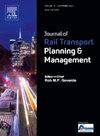Train rescheduling for a metro corridor under unidirectional disruptions considering the trade-off between confirm phase and interrupt phase
IF 2.7
Q3 TRANSPORTATION
Journal of Rail Transport Planning & Management
Pub Date : 2025-07-31
DOI:10.1016/j.jrtpm.2025.100534
引用次数: 0
Abstract
Metro systems serve as vital transportation arteries in large cities, playing a crucial role in public transit networks. However, failures such as track blockages, signal malfunctions, or train breakdowns frequently disrupt metro services. Given the substantial impact of different rescheduling strategies on transport capacity, this study incorporates the time required for dispatchers to confirm disruptions. The problem of large-scale rescheduling is reformulated into a two-stage process, the confirm phase and the interrupt phase, to analyze the trade-offs between various rescheduling strategies more effectively. Five rescheduling models are developed, each designed for specific turn-around scenarios, aiming to minimize total delay time and enhance train utilization efficiency. These models account for distinct operational conditions, train scheduling dynamics, and constraints associated with each turn-around type. The proposed rescheduling approach is applied to Shanghai Metro's Line 2, with experimental results confirming its effectiveness. The feasibility of the optimization outcomes is further validated using TPM commercial software. Additionally, the study evaluates the influence of confirmation time and turn-around type on rescheduling outcomes and overall efficiency.
考虑确认阶段与中断阶段权衡的单向中断条件下地铁走廊列车重新调度
地铁系统是大城市的交通要道,在公共交通网络中起着至关重要的作用。然而,轨道堵塞、信号故障或列车故障等故障经常扰乱地铁服务。考虑到不同的重新调度策略对运输能力的重大影响,本研究纳入了调度员确认中断所需的时间。为了更有效地分析各种重调度策略之间的权衡,将大规模重调度问题重新表述为确认阶段和中断阶段两个阶段的过程。开发了五种重新调度模型,每种模型都针对特定的转机场景设计,旨在最大限度地减少总延误时间,提高列车利用效率。这些模型考虑了不同的操作条件、列车调度动态以及与每种周转类型相关的约束。将该方法应用于上海地铁2号线,实验结果验证了该方法的有效性。利用TPM商业软件进一步验证了优化结果的可行性。此外,研究还评估了确认时间和周转类型对重调度结果和整体效率的影响。
本文章由计算机程序翻译,如有差异,请以英文原文为准。
求助全文
约1分钟内获得全文
求助全文
来源期刊

Journal of Rail Transport Planning & Management
TRANSPORTATION-
CiteScore
7.10
自引率
8.10%
发文量
41
 求助内容:
求助内容: 应助结果提醒方式:
应助结果提醒方式:


